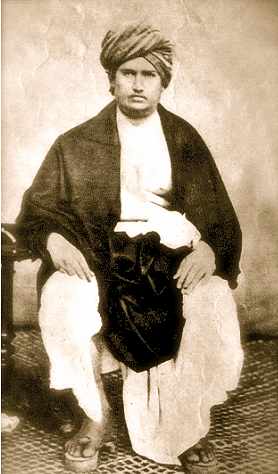PIB Summary- 12th February, 2024 | PIB (Press Information Bureau) Summary - UPSC PDF Download
Swami Dayananda Saraswati
Why in News?
The Prime Minister, Shri Narendra Modi on 11th February addressed a programme on the 200th birth anniversary of Swami Dayananda Saraswati organized at the birthplace of Swami Dayananda, Tankara in Morbi, Gujarat, via a video message.
About Dayanand Saraswati

- Swami Dayanand Saraswati was a philosopher, social leader and founder of the Arya Samaj, a reform movement of Vedic dharma.
- In 1875, he established the Arya Samaj in Bombay with ten principles based purely on God, soul, and nature.
- The organisation brought about immense changes in the religious perceptions of Indians. Swami Dayanand Saraswati was the first to give the call for Swaraj as “India for Indian” in 1876.
- He preached ‘Universalism’, rejecting any specific caste.
- His work had a significant impact on the education system, and he is often considered one of the visionaries of modern India.
- To realize his vision, the Dayanand Anglo Vedic (DAV) schools came into existence in 1886. The first DAV School was established in Lahore with Mahatma Hansarjas as the headmaster.
- One of his most influential works is the book Satyarth Prakash, which contributed to the Indian independence movement. His followers included Sri Aurobindo and S. Radhakrishnan.
Constitution (Jammu and Kashmir) Scheduled Tribes Order (Amendment) Bill 2024
Why in News?
Recently, the Parlaiment passed the Constitution (Jammu and Kashmir) Scheduled Tribes Order (Amendment) Bill, 2024, to include ‘Pahari Ethnic Group, Paddari Tribe, Koli and Gadda Brahmin’ communities in the list of STs of UT of Jammu and Kashmir.
Earlier, the Constitution (Scheduled Tribes) Order (Amendment) Bill, 2024 was passed and the bill intended to amend the Constitution (Scheduled Tribes) Order, 1950 to modify the list of Scheduled Tribes regarding Andhra Pradesh. The following inclusions will be made in list of Scheduled Tribes of Andhra Pradesh: –
- Inclusion of ‘Bondo Porja’ and ‘Khond Porja’, that are Particularly Vulnerable Tribal Groups (PVTGs), at entry 25 in the ST list of Andhra Pradesh.
- Inclusion of ‘Konda Savaras’, that are Particularly Vulnerable Tribal Groups (PVTGs), at entry 28 in the ST list of Andhra Pradesh.
Who are the Scheduled Tribes?
The Constitution does not define the criteria for recognition of Scheduled Tribes.
- However, Article 366(25) of the Constitution only provides process to define Scheduled Tribes: “Scheduled Tribes means such tribes or tribal communities or parts of or groups within such tribes or tribal communities as are deemed under Article 342 to be Scheduled Tribes for the purposes of this Constitution.”
- Article 342(1): The President may with respect to any State or Union Territory, and where it is a State, after consultation with the Governor, by a public notification, specify the tribes or tribal communities or part of or groups within tribes or tribal communities as Scheduled Tribe in relation to that State or Union Territory.
- The Dhebar Commission (1973) created a separate category “Primitive Tribal Groups (PTGs)” which was renamed in 2006 as “Particularly Vulnerable Tribal Groups (PVTGs)”.
Criteria for Inclusion in the Scheduled Tribe (ST) List:
The inclusion of a community in the Scheduled Tribe (ST) list is determined based on several criteria to establish its tribal identity and distinct cultural characteristics.
- Ethnological Traits: The community’s distinct and identifiable ethnological traits are considered to determine its tribal identity.
- Traditional Practices and Customs: The community’s traditional practices, customs, and way of life are examined to assess their adherence to tribal culture.
- Unique Culture: The presence of a unique and distinctive culture that sets the community apart from other groups is taken into account.
- Geographical Isolation: The community’s historical and continuous presence in specific regions, along with its geographical isolation, is considered.
- Socio-economic Backwardness: The level of socio-economic backwardness faced by the community is also evaluated.
- Lack of Defined Criteria: Notably, the Constitution of India does not provide a specific definition or set criteria for the recognition of Scheduled Tribes. The determination is made based on a combination of the above factors.





















